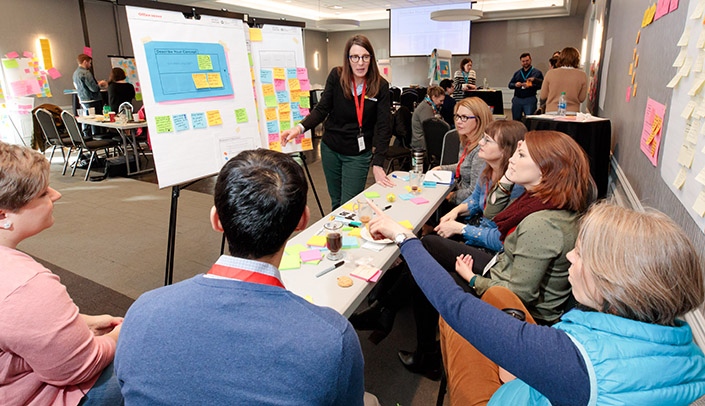UNMC and University of Nebraska at Omaha faculty and staff took part in a Design Thinking Boot Camp in November.
The three-day camp, led by Kathryn Segovia, Ph.D., head of Learning Experience Design
at the Stanford University Hasso Plattner Institute of Design, did not focus on design or graphic design, though.
“It’s more of a creative problem-solving approach, being thoughtful about how you solve human problems,” Dr. Segovia said.
At the boot camp, Munroe-Meyer Institute Director Karoly Mirnics, M.D., Ph.D., presented a problem to the group of 35 UNMC and UNO participants and eight coaches: Trying to better understand and improve how MMI provides care in the Autism Care for Toddlers (ACT) Clinic and how the clinics could expand to better serve the state of Nebraska, being human-centered and bold in the vision for the clinics.
On the first day of the camp, participants met and spoke in groups with parents of children on the autism spectrum who are current or past patients at the ACT Clinic. Each group then focused on something about the interviews that caught their attention, that they might leverage for solutions moving forward. They then test-piloted rough prototype solutions to a new set of parents and finally, on the third day, presented refined versions of the solutions to the larger group of participants.
“We intend to create a vibrant community of experts and space whereby our faculty, staff and students can use design thinking to solve challenging problems and improve processes on UNMC campuses and beyond,” said Dele Davies, M.D., senior vice chancellor for academic affairs at UNMC. “While we came together at this boot camp to solve one specific problem for MMI, this technique can be used for solving many kinds of problems and making current processes better.”
Jennifer Kallio, D.D.S., of the UNMC College of Dentistry, was one of the eight coaches, using her experience — she had attended design thinking training at Stanford — to guide her group members as they worked on their idea: a hospitality suite for the often-stressed parents who spend considerable portions of each day bringing their children for services.
“They’re going to call it MMISpace,” she said. “It will have an MMI connector, a person in that suite to connect parents with other parents with similar interests and to resources. That is our game-changer — how can we help this person feel like going to MMI is the most social part of his or her day?”
Kristina Cammarano, assistant vice chancellor for student success at UNO, was the coach for another group. She said it was important not to let feasibility get in the way of idea generation.
“There are so many pieces and ways to flex design thinking that make it a great tool to advance our universities as better, more person-centered places,” she said.
For Melonie Welsh, director of community engagement at MMI, the boot camp had an added benefit.
“There are some great ideas here,” she said. “But we’ve also developed a whole new circle of advocates who are learning about autism and what’s needed, what families go through, and that’s another layer — a new network for MMI.”
